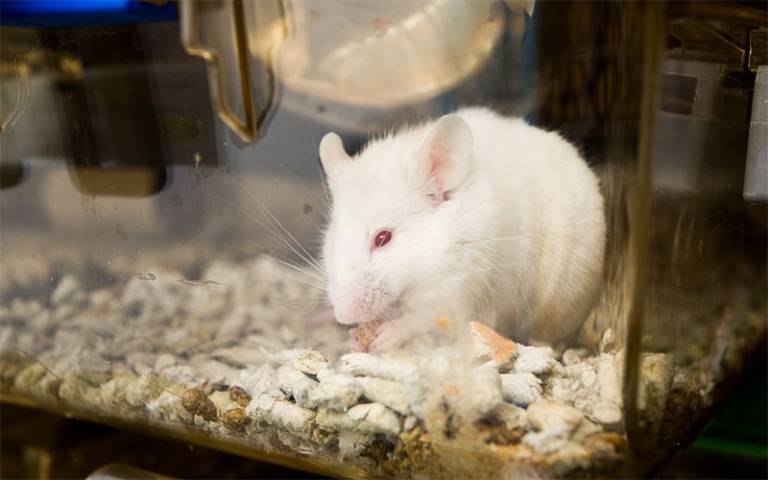UCL releases animal research statistics alongside fellow top institutions
30 June 2022
UCL is releasing its animal research statistics today in collaboration with Understanding Animal Research – a non-profit that promotes open communications about animal research.

UCL and nine other institutions together conducted nearly half of all animal procedures – those used in medical, veterinary, and scientific research – in the UK in 2021.
The statistics are freely available on UCL’s animal research website as part of our joint commitments to transparency and openness around the use of animals in research.
This list coincides with the publication of the Home Office’s report on the statistics of scientific procedures on living animals in Great Britain in 2021.
These ten organisations carried out 1,496,006 procedures, 49% or nearly half of the 3,056,243 procedures carried out on animals for scientific research in Great Britain in 2021. Of these 1,496,006 procedures, more than 99% were carried out on mice, fish and rats and 83% were classified as causing a similar level of pain, or less, as an injection.
The ten organisations are listed below alongside the total number of procedures carried out in 2021. Each organisation’s name links to its animal research webpage, which includes more detailed statistics. This is the seventh consecutive year that organisations have come together to publicise our collective statistics and examples of research.
Organisation | Number of Procedures (2021) |
207,192 | |
199,203 | |
185,278 | |
183,363 | |
172,100 | |
169,989 | |
111,750 | |
103,271 | |
87,535 | |
76,325 | |
TOTAL | 1,496,006 |
All organisations are committed to the ‘3Rs’ of replacement, reduction and refinement. This means avoiding or replacing the use of animals where possible; minimising the number of animals used per experiment and optimising the experience of the animals to improve animal welfare. However, as institutions expand and conduct more research, the total number of animals used can rise even if fewer animals are used per study.
Professor David Lomas, UCL Vice-Provost (Health), said: “Research using animals plays a small but vital role in UCL’s biomedical research, enabling us to make groundbreaking, life-saving advances; this is even more clear than ever as animal research enabled scientists to rapidly develop effective treatments and vaccines for Covid-19. Here at UCL we make every effort to ensure that animals are only used in research when strictly necessary, to treat them with utmost care, and to improve methods to minimise harm and maximise public benefit.”
All organisations listed are signatories to the Concordat on Openness on Animal Research in the UK, a commitment to be more open about the use of animals in scientific, medical and veterinary research in the UK. More than 125 organisations have signed the Concordat including UK universities, medical research charities, research funders, learned societies and commercial research organisations.
Wendy Jarrett, Chief Executive of Understanding Animal Research, which developed the Concordat on Openness, said: “Animal research remains a small but vital part of the quest for new medicines, vaccines and treatments for humans and animals. We know that the majority of the British public accepts that animals are needed for this research, but it is important that organisations that use animals in research maintain the public’s trust in them. By providing this level of information about the numbers of animals used, and the experience of those animals, as well as details of the medical breakthroughs that derive from this research, these Concordat signatories are helping the public to make up their own minds about how they feel about the use of animals in scientific research in Great Britain.”
Case study: Magnetic seeds used to heat and kill cancer
Scientists at UCL have developed a novel cancer therapy, now demonstrated in mice, that uses an MRI scanner to guide a magnetic seed through the brain to heat and destroy tumours.
The therapy is called “minimally invasive image-guided ablation” or MINIMA and comprises a ferromagnetic thermoseed navigated to a tumour using magnetic propulsion gradients generated by an MRI scanner, before being remotely heated to kill nearby cancer cells.
Researchers say the findings, published in Advanced Science, establish ‘proof-of-concept’ for precise and effective treatment of hard-to-reach glioblastoma, along with other cancers such as prostate, that could benefit from less invasive therapies. They say the therapy has the potential to extend survival, reduce recovery times, and to avoid traditional side effects by precisely treating the tumour without harming healthy tissues. Because the heating seed is magnetic, the magnetic fields in the MRI scanner can be used to remotely steer the seed through tissue to the tumour. Once at the tumour, the seed can then be heated, destroying the cancer cells, while causing limited damage to surrounding healthy tissues.
In the study, the UCL Centre for Advanced Biomedical Imaging team demonstrate the three key components of MINIMA to a high level of accuracy: precise seed imaging; navigation through brain tissue using a tailored MRI system, tracked to within 0.3 mm accuracy; and eradicating the tumour by heating it in a mouse model.
Ferromagnetic thermoseeds are spherical in shape, 2 mm in size and are made of a metal alloy; they are implanted superficially into tissue before being navigated to the cancer.
MRI scanners are readily available in hospitals around the world and are pivotal in the diagnosis of diseases such as cancer. The work at UCL shows that MINIMA has the potential to elevate an MRI scanner from a diagnostic device to a therapeutic platform.
Links
- UCL Animal Research website
- Detailed facts & figures of animal research at UCL
- Concordat on Openness on Animal Research in the UK
- News story: Magnetic seeds used to heat and kill cancer
Image
Lab mouse at UCL (Credit: David Bishop, UCL)
Media contact
Chris Lane
Tel: +44 (0)20 7679 9222
Email: chris.lane [at] ucl.ac.uk
 Close
Close

